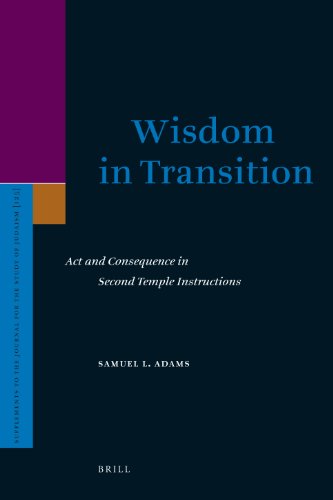Wisdom in Transition: Act and Consequence in Second Temple Instruction
Written by Samuel L. Adams Reviewed By Tremper Longman IIIAs the title indicates, Samuel L. Adams charts transitions in wisdom thinking during the Second Temple period, beginning with Proverbs against its ancient Near Eastern background, moving on to Ecclesiastes, then Ben Sira, and finally a more recently discovered and less well-known wisdom text from Qumran called 4QInstruction. In particular, Adams is interested in the important issue of retribution as it develops during the Second Temple Period. He sees a clear, linear development during this time period that begins with no belief in the afterlife to a warm embrace of the idea. Indeed, the development is so clear that one wonders whether it reflects reality.
The discussion of retribution in wisdom literature begins with concepts of a mechanized connection between act and consequence in both Egyptian literature (Brunner) and the book of Proverbs (Koch). Along with a majority of wisdom interpreters today, Adams questions whether there ever was a rigid idea that acts lead to their consequences naturally. I would agree, especially in the book of Proverbs, that though God is not always explicitly mentioned as the agent of retribution, his role is assumed. If wisdom and reward appear to be naturally connected to folly and punishment, the reason is that God has created the world to work that way.
More to the point of the main thesis of the book, Adams also argues that the authors of Proverbs have no belief in the afterlife. Of course, the book is filled with promise of life for the wise and of death for the fool, but Adams argues, along with the majority of modern scholars, that life is “length of days” rather than endless life. He believes rightly that the promise of life is a motivational feature of proverbs rather than a pronouncement of what will certainly be the case. In other words, if people act wisely in the prescribed ways, then they are acting in a way that enhances life, all other things being equal. He uses this lack of belief in the afterlife to date Proverbs to the early post-exilic period in a way that might lead a reader to wonder whether this kind of argument is circular. On the one hand, he is arguing for an evolution of wisdom thinking on the afterlife from Proverbs to 4QInstructions, but the reason he believes Proverbs is early (as opposed to late) postexilic is that it lacks afterlife theology (or at least this is the “clincher” for Adams). As for such a lack of belief, it is too bad that Adams chose to interact with a dated and discredited advocate of the view that Proverbs has at least an incipient sense of the afterlife (Dahood) and not more recent works (Waltke; Longman).
According to Adams, the lack of belief in the afterlife in Proverbs is simply a reflection of common opinion in the early postexilic period. When we come to Ecclesiastes, though, we have reached a new stage in the discussion. Qohelet also rejects the idea of an afterlife, but he must argue against it. Adams is well aware of the debates about the dating of the book. Though most today believe it is a postexilic book, it is not clear whether it is early or late postexilic. Adams argues well against those who believe it must be dated in the Persian period (Seow), but when it boils down to it, the only reason he confidently dates it in the Hellenistic period (ca. 200 BC) is its approach to the afterlife. Again, one must question the legitimacy of using the afterlife to date the book and appealing to the book to establish the evolution of the concept of the afterlife in wisdom literature.
Ben Sira shares Ecclesiastes’ rejection of the afterlife as an answer to retribution. In this, Adams argues that Ben Sira is critically interacting with other contemporary opinions, for instance, that provided by 1 Enoch. Where Ben Sira differs from Qohelet is in maintaining a more positive view about retribution. Even in death, the righteous find their reward, not in an afterlife, but in a well-deserved positive reputation.
Adams’ survey concludes with a close examination of 4QInstruction, a Dead Sea text that exhibits a robust view of the afterlife that will sound familiar to those who read the NT.
All in all, Wisdom in Transition is a fascinating and well-written presentation of the thesis that wisdom literature evolved in its treatment of retribution, moving from Proverbs’ lack of interest in the afterlife to the full embrace of the concept as an answer to how the wise are finally rewarded and fools punished.
Tremper Longman III
Westmont College Santa Barbara, California
Other Articles in this Issue
We want to understand how the power of God comes into our preaching...
Martin Luther was a pastor-theologian. He worked out his theology in the midst of teaching, preaching, participating in public controversy, and meeting all kinds of pastoral needs...
Bearing Sword in the State, Turning Cheek in the Church: A Reformed Two-Kingdoms Interpretation of Matthew 5:38–42
by David VanDrunenAmong the many biblical passages that provoke controversial questions about Christian non-violence and cooperation with the sword-bearing state, perhaps none presses the issue as sharply as Matt 5:38–42...
Does “Christocentrism” betray an asymmetrical trinitarianism that neglects the Father and the Spirit? The spate of calls for “Christ-centeredness” in evangelicalism’s past few generations collude with the twentieth century’s revivified trinitarianism to prompt this question...
feel honored to be able to give this lecture named after John Wenham...







